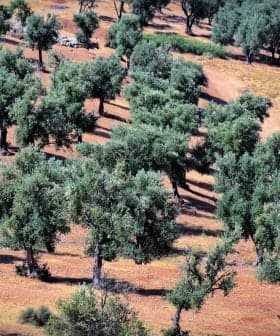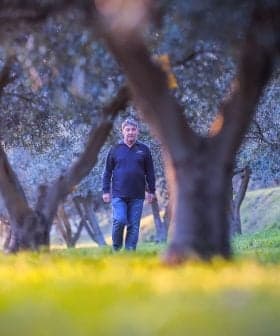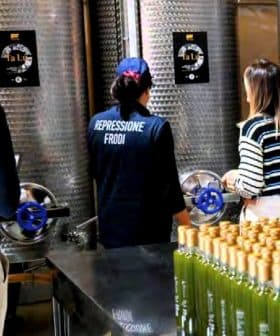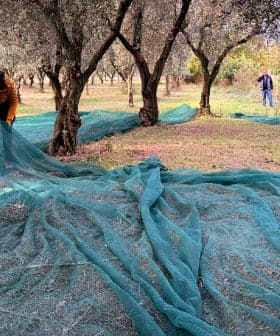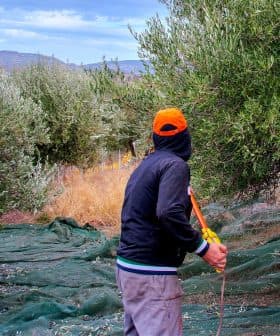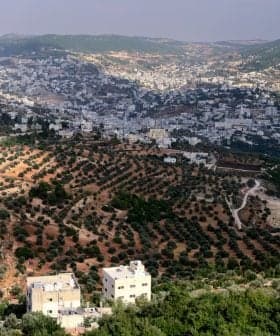Farmers in Lazio Kick Off Harvest at Emperor Hadrian's Estate
Agricultural associations used the event to emphasize the challenges facing traditional olive farmers in Italy.
 View of the Canopus in the Hadrian's Villa (Italian: Villa Adriana). In Tivoli, Italy
View of the Canopus in the Hadrian's Villa (Italian: Villa Adriana). In Tivoli, Italy Coldiretti and Unaprol expressed concern about the challenges facing traditional olive groves in Italy, warning that abandoned groves are increasing due to rising production costs and declining profits. The two associations emphasized the importance of restoring and maintaining historic olive trees to mitigate the impacts of climate change and reduce Italy’s dependency on olive oil imports.
In the heart of Roman Emperor Hadrian’s spectacular villa, not far from Rome, farmers harvested the olives of the Alberto Bello, the most famous of the ancient trees thriving on the huge estate.
The ceremony signaled the beginning of the 2022 harvest in the central Lazio region. Growers and producers used the unique historical setting to express their alarm about the challenges facing traditional olive groves in Italy.
Centuries-old olive trees are not only guardians of our history, but they might also contribute to helping us to better face climate change.
Coldiretti, a farmers’ union, and Unaprol, an olive oil producers’ association, warned that a growing number of olive groves are abandoned throughout the country as production costs rise and profit margins drop.
“Thirty million trees are at risk,” they said. The groups added that the impact of climate change is taking a toll on productivity while raising future uncertainty.
See Also:Olive Oil Production Revived in The Former Papal StatesDuring the ceremony, the associations emphasized how the Roman civilization significantly contributed to the development of olive growing and milling techniques. Olive oil became a source of wealth, and the methods Romans developed continued to be used until the end of the 19th century.
Coldiretti and Unaprol added that Italian olive culture comes from that tradition, as ancient Roman authors such as Marco Porzio Catone and Marco Terenzio Varrone in the third and second centuries CE wrote the first production instructions.
“Those were the theoretical and technical principles which today still constitute the basis for high-quality olive oil, with a unique range of flavor, tastes, nuances and intensities,” the two associations wrote.
Roman culture, they said, led to the many local olive oil producers who have made Italian olive oil famous throughout the world.
“Still, 20 percent of the 150 million olive trees of Italy is currently abandoned, as the effects of the war in Ukraine and the international tensions make it difficult to invest in olive growing,” the two associations wrote, citing data coming from Crea, the Italian Council for Research in Agriculture.
“With the costs for olive farms multiplying now by 200 percent, almost one out of 10 – 9 percent – works at a loss and risks closing down,” they added.
In the shade of the Albero Bello, the two associations said the overall volumes of olive production in the country are falling while energy costs have risen 170 percent.
Furthermore, fertilizer costs rose by 129 percent, glass by 30 percent, labels by 35 percent, cardboard by 45 percent, tin cans by 60 percent and plastics by 70 percent. On top of that, electricity now costs five times more than it did last year.
Nicola Di Noia, head of the olive oil department in Coldiretti, said the two associations “are committed to reverse course.”
“They are committed to restoring and maintaining the olive groves in some of the most relevant archeologic parks in Italy,” he added. “They are also trying to save the Monumental Olive Trees Valley hit by Xylella fastidiosa which is affecting Apulian olive farming.”
“By studying centuries-old trees such as Albero Bello in the Hadrian’s Villa… we might identify useful aspects of the resilience to climate change as well as the productive behavior [of the plants], the versatility towards the needs of sustainable intensification of olive cultivation and to improve the health characteristics of the [olive oil] products,” Di Noia continued.
David Granieri, Unaprol’s president, said mitigating the impacts of climate change is precisely why it is important to restore the production of Italy’s historic olive trees.
“Centuries-old olive trees are not only guardians of our history, but they might also contribute to helping us to better face climate change,” he said. “That is the reason we need to work to restore and bring back production to as many of those trees as possible.”
“The goal is not only to improve our knowledge but also to reduce our dependency from olive oil imports so as to relaunch with adequate investments Made in Italy extra virgin olive oil,” Granieri concluded.
Share this article


